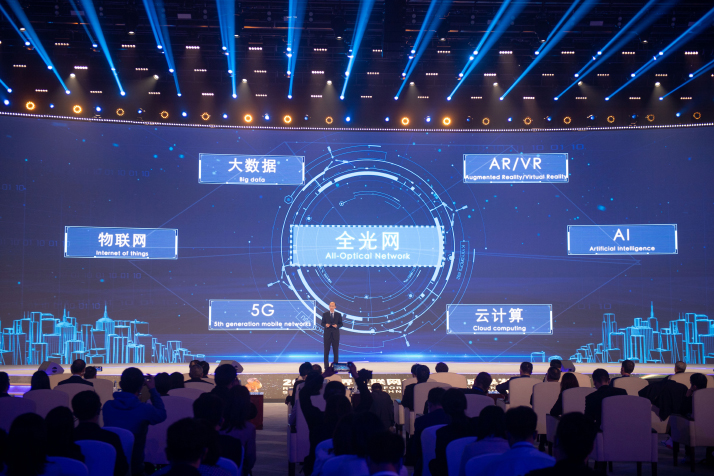| China |
| World builds consensus during Wuzhen conference | |
|
|
 A 5G technology exhibition in Harbin, Heilongjiang Province, in August (XINHUA)
About 3.7 billion people are not yet benefiting from access to the mobile Internet, John Hoffman, CEO of GSMA Ltd., an international association of mobile operators, said at the opening ceremony of the 2022 World Internet Conference (WIC) Wuzhen Summit in Wuzhen, Zhejiang Province, on November 9. "So, as we work toward building a better future and a more inclusive and connected society, we must focus on closing these gaps to make sure everyone has the chance to benefit from the transformational power of Internet access," Hoffman added. Themed Toward a Shared Digital Future in a Connected World—Building a Community With a Shared Future in Cyberspace, the three-day summit that concluded on November 11 saw the participation, both online and offline, of 2,100 guests from over 120 countries and regions, a record high. Participant debates led to a consensus on enhancing win-win digital cooperation, innovative development of the digital economy and governance of the digital ecosystem, Ren Xianliang, WIC Secretary General, said, adding further efforts should render emerging technologies more accessible and affordable, improve people's digital skills and build a digital sharing system that benefits all.  The ceremony announcing the world-leading Internet, scientific and technological achievements at the 2022 World Internet Conference on November 9 (XINHUA)
China act China ranks second in the world in terms of Internet development, according to the WIC bluebook released by the Chinese Academy of Cyberspace Studies during the summit. The bluebook consists of two separate reports—the World Internet Development Report 2022 and China Internet Development Report 2022. The reports have been released for six consecutive years since 2017 as an important part of the event. The Global Internet Development Index ranking, detailed in the first report, was based on six parameters: infrastructure, innovation capacity, industrial development, Internet application, cybersecurity and Internet governance. The top 10 economies leading Internet development this year are the U.S., China, Germany, Sweden, the Netherlands, the Republic of Korea, the UK, Canada, Finland and Denmark. China Internet Development Report 2022 features the achievements of the country's Internet sector in the past year. According to it, the value of China's digital economy reached 45.5 trillion yuan ($6.3 trillion) in 2021, accounting for 39.8 percent of the country's GDP. Data released by the Ministry of Industry and Information Technology in May revealed that China had built nearly 1.6 million 5G base stations, constituting the world's largest 5G network. A recent GSMA analysis showed that strong 5G demand on the Chinese mainland has made it the single largest 5G market in the world, with 5G connections accounting for over 75 percent of the global total at the end of 2021. "We are now seeing 5G beginning to take off around the world with China as one of its global pioneers; with it, we are seeing even more transformation as 5G automates our factories, connects our cities, connects transport, provides innovative healthcare and remakes education," Hoffman said. In China, a large number of farmlands now adopt intelligent management systems, thanks to the advancement of Internet science and technology like unmanned agricultural machinery, pest and meteorological monitoring and remote controlled irrigation. Zhu Yongtao, Senior Vice President of ZTE Corp., said that thanks to a project the company has participated in over recent years, the 5G signal now extends more than 100 km from the coast of Fujian Province, which not only makes it convenient and efficient for fishers to fish, but also enables them to quickly receive information and better understand the fishing situation when they go to sea. Take smart buoys, one of the most outstanding examples of connectivity applied to the sea. These provide ships with information on the location of schools of fish and allow them to know the approximate number of fish, the species and other relevant data. At the summit, 12 Outstanding Cases of Jointly Building a Community With a Shared Future in Cyberspace and 15 World Leading Internet Scientific and Technological Achievements were commended. The IPv6+ Standards Formulation, Device Development and Networking spearheaded by telecom service provider China Unicom was one of the laureates. The technology, based on the continuing evolution and innovation of Internet Protocol version 6 (IPv6), the most recent version of the protocol, ensures higher-speed and safer online services. For example, a smart data private network based on it was built during the Beijing Winter Olympics earlier this year, providing the shortest latency, the highest performance, and most reliable high-quality service to the Olympics and the Paralympics, Liang Baojun, Vice President of China Unicom, said.  A robot dog draws the attention of visitors during the Light of Internet Expo, part of the 2022 World Internet Conference Wuzhen Summit, in Wuzhen, Zhejiang Province, on November 10 (XINHUA)
Shared cyber future The summit has been held for nine consecutive years and this year's event is the first WIC annual meeting following its inauguration as an international organization headquartered in Beijing earlier this year. Using digital technology to promote social and economic development, bridge the development gap and achieve sustainable economic and social development in the post-COVID-19 era is crucial, Zhao Houlin, Secretary General of International Telecommunication Union, said during the summit. "Meeting these goals, however, requires considerable effort from the international community." Echoing Zhao, Omar bin Sultan Al Olama, the United Arab Emirates Minister of State for Artificial Intelligence, Digital Economy and Remote Work Applications, called for joint efforts to advocate for the next generation of the Internet to be a collaborative mechanism, as well as an ecosystem that pushes for tolerance and the use of open, standard protocols. He said there are new opportunities in the metaverse, Web 3.0 and others, yet there are also certain risks of technological hegemony, new vulnerabilities, the use of these tools with malicious intent, political risks and the danger of cyber bullying or harassment. "The more we work with each other and focus on building a global community that works as one uniform team to eradicate disease, poverty, climate change and inequality, the better life is going to be for all of us living in this global community," the minister said. Efforts have been made to address such challenges. There has been progress on data and privacy governance over the past three years, which includes the cyberspace standards endorsed at the United Nations in March 2021, the Data Governance Act of the European Union, and the Cybersecurity Law, the Data Security Law, and the Personal Information Protection Law of China, as well as multilateral regimes, according to U.S.-China Business Council President Craig Allen. However, given these disparate approaches, companies today face diverse regulatory regimes with different priorities and sensitivities, Allen said during the summit. He added China and the U.S. should harmonize data movement across borders, and the connectivity between the two economies should not be disrupted unnecessarily. "Creation of innovative, pragmatic and well-reasoned policies is essential to unlocking the limitless potential of the digital revolution while balancing the need for security, safety and privacy," he said. On November 7, China's State Council Information Office released a white paper titled Jointly Build a Community With a Shared Future in Cyberspace. "To build a community with a shared future in cyberspace, we should hold to a vision of extensive consultation, joint contribution and shared benefits in global governance and promote a multilateral, democratic and transparent international Internet governance system. We strive to realize the goals of innovation-driven development, security, order, equality, respect, openness and shared interests in cyberspace, so that cyberspace will be a community that benefits all of humanity," the white paper said. In doing so, basic principles, including respecting cybersovereignty, safeguarding peace and security, promoting openness and cooperation, and maintaining good order, should be adhered to, the white paper noted. (Print Edition Title: Internet Connection) Copyedited by G.P. Wilson Comments to luyan@cicgamericas.com |
|
||||||||||||||||||||||||||||||
|
